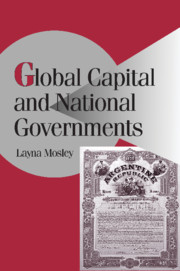
-
Select format
-
- Publisher:
- Cambridge University Press
- Publication date:
- January 2010
- February 2003
- ISBN:
- 9780511615672
- 9780521815215
- 9780521521628
- Dimensions:
- (228 x 152 mm)
- Weight & Pages:
- 0.76kg, 402 Pages
- Dimensions:
- (228 x 152 mm)
- Weight & Pages:
- 0.59kg, 402 Pages
You may already have access via personal or institutional login
Book description
Global Capital and National Governments suggests that international financial integration does not mean the end of social democratic welfare policies. Capital market openness allows participants to react swiftly and severely to government policy; but in the developed world, capital market participants consider only a few government policies when making decisions. Governments that conform to capital market pressures in macroeconomic areas remain relatively unconstrained in supply-side and micro-economic policy areas. Therefore, despite financial globalization, cross-national policy divergence among advanced democracies remains likely. Still, in the developing world, the influence of financial markets on government policy autonomy is more pronounced. The risk of default renders market participants willing to consider a range of government policies in investment decisions. This inference, however, must be tempered with awareness that governments retain choice. As evidence for its conclusions, Global Capital and National Governments draws on interviews with fund managers, quantitative analyses, and archival investment banking materials.
Reviews
‘The book is a very interesting empirical case-study … well structured … offers a rare and highly relevant insight into the thinking and judgments of institutional investors … Mosley offers considerable empirical depth and goes beyond the generalizations often employed in other studies within the wider discourse of how globalization has affected national policy autonomy. She offers an important contribution to the growing literature on how domestic economies interact with the wider global economy and how these two arenas influence each other at different points in time.’
Source: International Affairs
Contents
Metrics
Altmetric attention score
Full text views
Full text views help Loading metrics...
Loading metrics...
* Views captured on Cambridge Core between #date#. This data will be updated every 24 hours.
Usage data cannot currently be displayed.
Accessibility standard: Unknown
Why this information is here
This section outlines the accessibility features of this content - including support for screen readers, full keyboard navigation and high-contrast display options. This may not be relevant for you.
Accessibility Information
Accessibility compliance for the PDF of this book is currently unknown and may be updated in the future.


